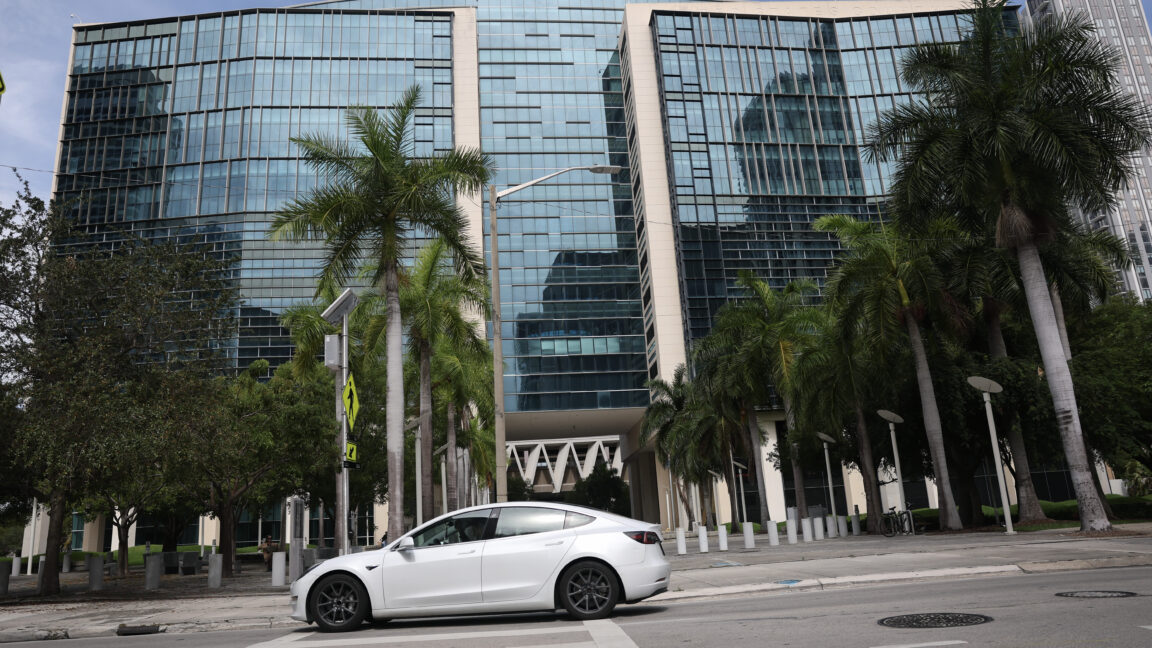
Credit: Joe Raedle/Getty Images
This week, a federal court in Miami started hearing a wrongful death case involving Tesla's crash-prone Autopilot driver assistance system. It's not the first time that Tesla Autopilot has been implicated in fatal traffic crashes, but it is the first time that a federal court has heard such a case.
Until now, the most high-profile court case involving Tesla Autopilot was probably the California trial over the death of Walter Huang, who was killed in 2018 when his Tesla Model X steered itself into a concrete highway divider. Huang's family took Tesla to court in April 2024 but quickly settled with the automaker under terms that have been kept secret.
And earlier this week, Tesla settled another Autopilot lawsuit concerning the death of Jeremy Banner in 2019. In that case, the Tesla's sensors failed to recognize a tractor-trailer crossing the highway and collided with it, shearing the top off the car and killing Banner.
So far, Tesla has been unable to settle with the plaintiffs in the federal case, which also concerns a fatal crash in 2019 in Florida. In this case, in April 2019, a Tesla being driven by George McGee sped through a stop sign in the Florida Keys and struck Naibel Benavides and Dillon Angulo, who were standing near their car and stargazing. Benavides was killed, and Angulo was left with a brain injury.
"I feel like we were experimented on, and this technology was out on the road before it was safe," Angulo told an NBC interviewer in 2023.
What did the experts say?
Missy Cummings, a former fighter pilot and expert on autonomous systems, pulled few punches. Cummings, who received torrents of abuse from Tesla fans after being appointed to a senior advisor position at the National Highway Traffic Safety Administration in 2021, told the court that "it is my professional opinion that Tesla's Autopilot is defective because Tesla knowingly allows the car to be operated in operational domains for which it is explicitly not designed for."
Tesla's cockpit monitoring of drivers to ensure they remain alert "is simply not sufficient as keeping the driver engaged," Cummings told the court. And Tesla has a long history of "promoting the abuse and misuse of Autopilot." Cummings' testimony detailed her work at NHTSA investigating other fatal Tesla crashes, like the 2016 death of Joshua Brown, and detailed some of the interactions she and her agency had had with the car company.
For example, she said Tesla "clearly recognized that mode confusion is an issue—this is where people, for example, think the car is in Autopilot and don't understand that the Autopilot has disengaged," she told the court.
Cummings also referred to the deposition of Tesla autopilot firmware engineer Ajshay Phatak. Phatak's deposition told the court that the company did not keep good track of Autopilot crashes prior to 2018, and Cummings pointed out that "it was clear they knew that they had a big problem with people ignoring the warnings. Ignoring the hands-on requests. And...as you know, prior to this accident. It was known to Tesla that they were having problems with people ignoring their warnings."
Tesla's abuse of statistics to make misleading claims about safety are nothing new: in 2017, Ars found out that Tesla's claims about Autopilot reducing crashes was not at all backed by data, which in fact showed the driver assist actually increased crash rates.
Mendel Singer, a statistician at Case Western University School of Medicine, was very unimpressed with Tesla's approach to crash data statistics in his testimony. Singer noted that he was "not aware of any published study, any reports that are done independently... where [Tesla] actually had raw data and could validate it to see does it tend to make sense" and that the car company was not comparing like with like.
"Non-Teslas crashes are counted based on police reports, regardless of safety system deployment," Singer said. Further, Tesla kept misleading claims about safety on its website for years, Singer pointed out. When asked whether he would have accepted a paper for peer review from Tesla regarding its reports, "that would have been a really quick and easy rejection," he said.
While it's possible that Tesla will still settle this case, we may also see the trial carried out to its conclusion.
"The plaintiffs in this instance have already received compensation from the driver of the Tesla in question, apparently in a decent amount. My understanding is that this makes them much less likely to take the kinds of offers Tesla has been making for settlements, and this is more about the justice," said Edward Niedermeyer, author and long-time Tesla-watcher.
"That said, the judge in the case has made some frustrating rulings around confidentiality on key issues, so it's possible that may be in Tesla's favor. They could also just up their settlement offer enough to be impossible to refuse," Niedermeyer said.

-
 C114 Communication Network
C114 Communication Network -
 Communication Home
Communication Home


